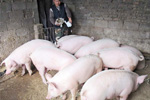Nuclear approvals to be resumed at slower rate
Updated: 2012-02-01 08:58
By Liu Yiyu (China Daily)
|
|||||||||||
|
The Sanmen Nuclear Power Project under construction in Zhejiang province. China approved six new projects last year before the Japanese nuclear crisis in March 2011. [Photo/China Daily] |
The nation will restart projects soon, however, numbers are set to be reduced
BEIJING - China will slow approvals of nuclear projects after the resumption, which is expected to take place this year, according to an industry expert from a national energy think tank.
"China will be cautious in pursuing nuclear power and is likely to approve only three or four projects each year, compared with the boom in new projects during the 11th Five-Year Plan period (2005-2010)," said Xiao Xinjian, a nuclear industry expert at the national Energy Research Institute, affiliated with the National Development and Reform Commission.
The country had been accelerating its nuclear development since 2008, with 14 reactors approved in 2008 and six in 2009.
Following the nuclear leak in Japan in the wake of the March 11 earthquake and tsunami, the Chinese government announced a suspension of approvals for nuclear power stations. It also conducted rigorous safety checks at all nuclear projects, including those under construction. No new project was approved or started last year.
"Projects that had already received approval before the suspension will likely start construction in the second half of this year," according to Xiao.
China had six new projects approved before the Japanese nuclear crisis. Construction was suspended because of safety concerns.
The country will see a boom in the construction of nuclear projects between 2013 and 2015, according to Xiao's estimates.
The State Council, China's cabinet, is currently reviewing the plans outlining the country's nuclear targets and routes.
The nation is likely to introduce third-generation (3G) nuclear technology in all future plants because of more stringent safety standards, according to a source close to the matter.
It is possible that projects using advanced second-generation technology and starting preliminary work may switch to 3G if the government made such a move mandatory, according to Xiao.
China introduced the AP 1000 3G nuclear technology in 2007 through its nuclear technology arm, State Nuclear Power Technology Corp (SNPTC).
The first AP 1000 reactor will become operational in 2013, as scheduled, despite delays caused by redesigns by the US technology developer Westinghouse Electric Co, according to SNPTC.
"Though we are confident about the schedule, the project (first unit) remains a big challenge," a senior official of the company told China Daily.
China is building the world's first AP 1000 reactor. Construction of the first unit in Zhejiang province began in 2009 but slowed after the nuclear crisis in Japan.
The indigenous rate (that is, using components made in China) of the first four reactors using the AP1000 technology is 55 percent on average.
"It is hard to achieve 100 percent localization over a short period," the source said.
Meanwhile, China is also developing its first domestic 3G nuclear reactor - the CAP 1400 - which is based on the AP1000 and will boost the unit's generating capacity to 1,400 megawatts (mW) from 1,154 mW.
Preliminary designs for the technology will be completed by the end of this year.
 |
Related Stories
Approvals halted for new nuclear plants 2011-03-17 07:58
China approves 10 more nuclear power generators 2011-01-26 07:56
Nuclear projects continue 2011-05-26 09:41
Go slow for nuclear power projects 2011-03-18 09:34
China's nuclear power projects continue 2011-05-26 07:35
- Sany buying German firm
- CSIC looks to harness wind power
- Unclear 2012 for ChiNext, analysts caution
- Shanghai banks lower mortgage interest rates
- Concerns grow over safety of food imports
- Multinationals keen to recruit Chinese execs
- Ministry 'ready' to face rare earth push
- PMI rises to 50.5% in January









